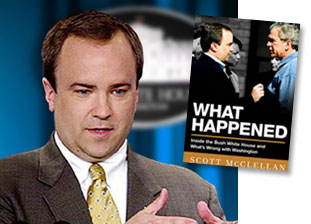ASKIAM
-Senior Correspondent-
Washington D.C. ‘a culture of deception’ says former staffer, Scott McClellan
- Report documents over 935 lies leading to Iraq war (FCN, 02-06-2008)
- More lies for a new war? US spy chief retreats from Iran intel report (PressTV, 02-06-2008)
- Democrats Earn Their Stripes in the War Party (AntiWar.com, 04-04-2007)
- The “War on Terror” Exposed (FCN/Minister Farrakhan, 05-03-2004)

WASHINGTON (FinalCall.com) – Yet another intimate confidante of President George W. Bush, former White House press secretary Scott McClellan has publicly charged the President with misleading the country into the Iraq war.
And despite White House efforts to “spin” the discussion away from the President’s deceit, Mr. McClellan’s assertions, in a new book–titled: “What Happened: Inside the Bush White House and Washington’s Culture of Deception”–further reveal an administration bent on going to war.
During an appearance on NBC’s “Meet The Press” June 1, the former Bush administration press secretary defended his portrait of Mr. Bush as “too stubborn to change and grow,” while admitting he should have voiced his doubts and questions about the march to war in 2002 and 2003.
Mr. McClellan said he realized in late 2001 that Mr. Bush had made up his mind to invade Iraq “when the president did interviews with Bob Woodward for his book.” His charges have been given great authority because of Mr. McClellan’s former status as a White House insider who served as Press Secretary for two years and nine months.
These charges are nothing new, and should come as no surprise, according to one authority on White House attempted cover-ups.
“Many of us had been reporting that Bush had lied repeatedly back in 2002, 2003, and since then. And much of that was rejected and criticized by many of the same people in the White House who have protected Bush’s deceptions for many years. Scott McClellan happened to be one of them at that time,” Robert Parry, author of “Neck Deep: The Disastrous Presidency of George W. Bush” told The Final Call. “Now he’s acknowledging that indeed, those of us who reported on Bush’s behavior and critics who opposed Bush’s behavior may have been right.”
Critics were branded, said Mr. Parry, whose latest article is titled “Surprise, Surprise: Bush Lied.” Critics were accused of “derangement,” and “treason,” he said. “But the more troubling point is that there has been little improvement in the Washington political/media structure that failed to call Bush out on his lies in a timely fashion,” he continued. But blame for Mr. Bush’s deceit must also be shared by government officials and the news media.
“Though Bush’s White House and his Republican allies may stand out as the principal villains in this tragic story, a large share of the blame also must fall on accommodating Democrats and careerists in the Washington press corps,” said Mr. Parry, “They protected their political flanks and their nice salaries by playing along.” But more than four years ago, the first serious cracks in the U.S. pro-war propaganda machine appeared when former Treasury Secretary Paul O’Neill claimed in Jan. 2004 that the president and his closest aides were looking for a justification for invading Iraq, even before the Sept. 11, 2001 attacks on Washington and New York City.
“From the very beginning, there was a conviction that Saddam Hussein was a bad person and he needed to go,” said Mr. O’Neill in his book “The Price of Loyalty: George W. Bush, the White House and the Education of Paul O’Neill.” The “very beginning” means his first National Security Council meeting with the Bush team, less than two weeks after Mr. Bush’s inauguration on Jan. 20, 2001.
But Mr. Bush persisted with his false arguments for the war. The danger posed by Iraq was “urgent,” “already significant,” and “imminent” Mr. Bush said time and time again in the lead-up to the U.S. invasion, arguing that the country possessed “thousands of tons of chemical agents, including mustard gas, sarin nerve gas, VX nerve gas.”
“And it only grows worse with time,” Mr. Bush said in one speech. “If we know Saddam Hussein has dangerous weapons today–and we do–does it make any sense for the world to wait to confront him as he grows even stronger and develops even more dangerous weapons?
“Facing clear evidence of peril, we cannot wait for the final proof–the smoking gun– that could come in the form of a mushroom cloud,” Mr. Bush continued on Oct. 7, 2002, raising the specter of a nuclear attack against the U.S., an all but impossible scenario.
What happened as a result of the U.S. invasion was the real tragedy however. “In Iraq alone, the consequences for that dereliction of duty include more than 4,000 U.S. dead along with hundreds of thousands of slain Iraqis, and possibly trillions of taxpayer dollars wasted,” said Mr. Parry who first reported many Iran-Contra revelations in the 1980s for the Associated Press and Newsweek.
Mr. McClellan says the “defining moment in my time working for the president, and one of the most painful experiences of my life,” occurred in July 2005, when he discovered that what he had told the press two years earlier–that Karl Rove and Lewis Libby were not involved in “the leaking of classified information” about Valerie Plame, Wilson’s wife–was untrue.
“I had unknowingly passed along false information,” he writes. “And five of the highest-ranking officials in the administration were involved in my doing so: Rove, Libby, Vice President Cheney, the president’s chief of staff Andrew Card, and the president himself.” Upon learning this, he felt “constrained by my duties and loyalty to the president and unable to comment. But I promised reporters and the public that I would someday tell the whole story of what I knew.” says Mr. McClellan.
“I’ve written it not to settle scores or enhance my own role,” he says, “but simply to record what I know and what I learned.”












